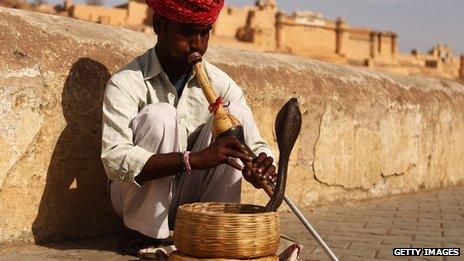Is bad politics ruining India?
- Published
- comments

Is India losing its mojo because of bad politics?
It's an obvious question to ask at a time when powerful - and populist - regional parties are again flexing their muscles at a fickle federal government, key economic reforms are seemingly stuck in the bog of messy coalition politics, and the government is struggling under an avalanche of corruption charges. Economic growth and investment have cooled and inflation remains high.
So is it surprising that The Economist magazine, in its latest issue, says, external the politics is "preventing India from fulfilling its vast economic potential"?
Or when Fareed Zakaria, editor-at-large with Time magazine, tells, external an audience in Delhi this week that India's politicians are "out of touch… they try to portray India as a victim, not the victor".
With uncharacteristic exaggeration, The Economist even invokes a return to the stifling days of the controlled economy.
"Lately, like a Bollywood villain who just refuses to die, the old India has made a terrifying reappearance," says the magazine. It blames a "nastily divisive political climate" for the crisis and believes that India requires "energetic, active leaders, plus politicians who are ready to compromise".
'Corrupt and corroded'
Both the magazine and the pundit are right and wrong.
The quality of India's politicians, many argue, has declined drastically, as in many parts of the world. Most of them seem to be out of sync with modern day realities - expectations have fallen so ridiculously low that an iPad carrying politician is described by the media as a modern one!
Most are also seen as greedy, corrupt and disinterested in serious reform. The increasing number of politicians with criminal records and the brazen use of money to buy party tickets and bribe voters erodes India's ailing democratic process.
It is not a happy picture. "Today the Centre is corrupt and corroded," historian Ramachandra Guha wrote recently, external. "There are allegedly 'democratic' politicians who abuse their oath of office and work only to enrich themselves; as well as self-described 'revolutionaries' who seek to settle arguments by the point of the gun." Only serious electoral reform can ensure a better breed of politician.
But to believe that less politics is good economics is a bit fey. There is little evidence to argue that political instability has been bad for India's economy.
India's first flush of economic reforms was launched by a minority government headed by PV Narasimha Rao of the Congress party in the early 1990s. The reforms spluttered to a halt when the government secured a majority.
Later, a rag-tag 13-party coalition United Front government, external helmed by two prime ministers in 18 months in the mid-1990s undertook significant reforms, slashing taxes, deregulating interest rates and moving towards capital account convertibility.
One study by Kausik Chaudhuri and Sugato Dasgupta actually found that more investments take place when coalition governments are in power, one of the reasons being various regional interests are held together by "generous distribution of infrastructure projects". Economist Surjit Bhalla has argued that political instability is actually good for economic reforms.
"The contention is that lack of political dominance means that politicians in power will make the extra reform in order to fight for marginal votes in a future election," he has said. "And if political stability is present, the politicians are unlikely to make an effort because of their inherent short sightedness or complacence."
Elitist biases
The problem, as Paranjoy Guha Thakurtha and Shankar Raghuraman argue succinctly in a study of coalition politics in India, is that privatisation - a key aspect of economic reforms - remains a dirty word with most of India's politicians, trade unionists and opinion makers.
There is still a serious lack of political consensus on issues like foreign investment, lowering interest rates on deposits in pension funds and privatising profit-making state-run factories.
Public consensus is harder to come by in an awfully unequal society where the middle class and the rich root for further opening up of the economy, while the poor want the state to invest in health and education and check corruption. The elitist biases in public policy is made easier by a poorly-informed and often unlettered electorate with low expectations.
Many would argue that India never got any magic going, so there is no question of losing it.
Consensus is painfully slow in such a society, and sometimes only a crisis can provoke the government - and the people - to bite the bullet. Reformers need to be patient; there are no shortcuts in India.